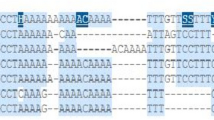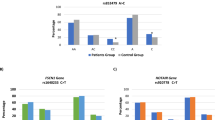Abstract
Cyclin D1 (CCND1) and E-cadherin (CDH1) are two important genes of the β-catenin/LEF pathway that is involved in tumorigenesis of various cancers including colorectal cancer (CRC). However, studies of the association between genetic variants of these two genes and CRC have shown conflicting results. We conducted a genetic association study in South Indian population (cases, 103; controls, 107) to assess the association of CCND1 870G/A and CDH1 −160C/A single nucleotide polymorphisms (SNPs) with CRC risk. Genotyping of SNPs was performed by PCR sequencing analysis. Haplotype frequencies for multiple loci and the standardized disequilibrium coefficient (D′) for pair-wise linkage disequilibrium (LD) were assessed by Haploview Software. In addition, to better understand the role of CCND1 and CDH1 in the pathophysiology of CRC, the expression pattern was evaluated in analogous tumor and adjacent normal tissues from 23 CRC patients by Western blot analysis. The frequencies of CCND1 870A/A (P = 0.045) genotype, CDH1 −160A allele (P = 0.042), and 870A/−160A haplotype (P = 0.002) were significantly higher in patients as compared with controls. Strong LD was observed between 870G/A and −160C/A SNPs in cases (D′ = 0.76) as compared to controls (D′ = 0.32). Furthermore, elevated CCND1 and diminished CDH1 expression was observed in tumor tissue as compared with analogous normal tissue of CRC patients. Interestingly, advanced-stage tumors showed wider expression alterations than in early-stage tumors. In conclusion, CCND1 870G/A and CDH1 −160C/A SNPs may modify the risk of CRC susceptibility in South Indian population. In addition, elevated CCND1 and diminished CDH1 expression appears to be useful prognostic markers for CRC.





Similar content being viewed by others
References
Center MM, Jemal A, Smith RA, Ward E. Worldwide variations in colorectal cancer. CA Cancer J Clin. 2009;59:366–78.
Muzny DM, Bainbridge MN, Chang K, Dinh HH, Drummond JA, Fowler G, et al. Comprehensive molecular characterization of human colon and rectal cancer. Nature. 2012;487:330–7.
Markowitz SD, Bertagnolli MM. Molecular origins of cancer: molecular basis of colorectal cancer. N Engl J Med. 2009;361:2449–60.
Singamsetty GK, Malempati S, Bhogadhi S, Kondreddy R, Govatati S, Tangudu NK, et al. TP53 alterations and colorectal cancer predisposition in south Indian population: a case-control study. Tumor Biol. 2014;35:2303–11.
Fearon ER, Vogelstein B. A genetic model for colorectal tumorigenesis. Cell. 1990;61:759–67.
Fuchs SY, Ougolkov AV, Spiegelman VS, Minamoto T. Oncogenic β-catenin signaling networks in colorectal cancer. Cell Cycle. 2005;4:1522–39.
Shtutman M, Zhurinsky J, Simcha I, Albanese C, D’Amico M, Pestell R, et al. The cyclin D1 gene is a target of the beta-catenin/LEF-1 pathway. Proc Natl Acad Sci U S A. 1999;96:5522–7.
Arber N, Hibshoosh H, Moss SF, Sutter T, Zhang Y, Begg M, et al. Increased expression of cyclin D1 is an early event in multistage colorectal carcinogenesis. Gastroenterology. 1996;110:669–74.
Arber N, Doki Y, Han EK, Sgambato A, Zhou P, Kim NH, et al. Antisense to cyclin D1 inhibits the growth and tumorigenicity of human colon cancer cells. Cancer Res. 1997;57:1569–74.
Gerard C, Goldbeter A. Temporal self-organization of the cyclin/Cdk network driving the mammalian cell cycle. Proc Natl Acad Sci U S A. 2009;106:21643–8.
Berthet C, Klarmann KD, Hilton MB, Suh HC, Keller JR, Kiyokawa H, et al. Combined loss of Cdk2 and Cdk4 results in embryonic lethality and Rb hypophosphorylation. Dev Cell. 2006;10:563–73.
Betticher DC, Thatcher N, Altermatt HJ, Hoban P, Ryder WD, Heighway J. Alternate splicing produces a novel cyclin D1 transcript. Oncogene. 1995;11:1005–11.
Pabalan N, Bapat B, Sung L, Jarjanazi H, Pabalan OF, Ozcelik H. Cyclin D1 Pro241Pro (CCND1-G870A) polymorphism is associated with increased cancer risk in human populations: a meta-analysis. Cancer Epidemiol Biomarkers Prev. 2008;17:2773–81.
Yang Y, Wang F, Shi C, Zou Y, Qin H, Ma Y. Cyclin D1 G870A polymorphism contributes to colorectal cancer susceptibility: evidence from a systematic review of 22 case-control studies. PLoS One. 2012;7:e36813.
Frixen UH, Behrens J, Sachs M, Eberle G, Voss B, Warda A, et al. E-cadherin-mediated cell–cell adhesion prevents invasiveness of human carcinoma cells. J Cell Biol. 1991;113:173–85.
Elzagheid A, Ålgars A, Bendardaf R, Lamlum H, Ristamaki R, Collan Y, et al. E-cadherin expression pattern in primary colorectal carcinomas and their metastases reflects disease outcome. World J Gastroenterol. 2006;12:4304–9.
Kowalski PJ, Rubin MA, Kleer CG. E-cadherin expression in primary carcinomas of the breast and its distant metastases. Breast Cancer Res. 2003;5:R217–22.
Dorudi S, Sheffield JR, Poulsom R, Northover JMA, Hartt IR. E-cadherin expression in colorectal cancer. An immunocytochemical and in situ hybridization study. Am J Pathol. 1993;142:1981–6.
van de Wetering M, Barker N, Harkes IC, van der Heyden M, Dijk NJ, Hollestelle A, et al. Mutant E-cadherin breast cancer cells do not display constitutive Wnt signaling. Cancer Res. 2001;61:278–84.
Li LC, Chui RM, Sasaki M, Nakajima K, Perinchery G, Au HC, et al. A single nucleotide polymorphism in the E-cadherin gene promoter alters transcriptional activities. Cancer Res. 2002;60:873–6.
Tipirisetti NR, Govatati S, Govatati S, Rao KL, Cingeetham A, Singh L, et al. Association of E-cadherin single nucleotide polymorphisms with the increased risk of breast cancer: a study in South Indian women. Genet Test Mol Biomarkers. 2013;17:494–500.
Govatati S, Tangudu NK, Deenadayal M, Chakravarty B, Shivaji S, Bhanoori M. Association of E-cadherin single nucleotide polymorphisms with the increased risk of endometriosis in Indian women. Mol Hum Reprod. 2012;18:280–7.
Geng P, Chen Y, Ou J, Yin X, Sa R, Liang H. The E-cadherin (CDH1) -C160A polymorphism and colorectal cancer susceptibility: a meta-analysis. DNA Cell Biol. 2012;31:1070–7.
International Union Against Cancer (UICC): In: TNM classification of malignant tumours. Hermaek P, Hutter RVP and Sobin LH (eds.). Berlin: Springer-Verlag, 1998.
Govatati S, Tipirisetti NR, Perugu S, Kodati VL, Deenadayal M, Vishnupriya S, et al. Mitochondrial genome variations in advanced stage endometriosis: a study in South Indian population. PLoS One. 2012;7:e40668.
Govatati S, Deenadayal M, Shivaji S, Bhanoori M. Mitochondrial D-loop alterations are associated with endometriosis. Fertil Steril. 2013;99:1980–6.
Govatati S, Kodati VL, Deenadayal M, Chakravarty B, Shivaji S, Bhanoori M. Mutations in the PTEN tumor suppressor gene and risk of endometriosis: a case-control study. Hum Reprod. 2014;29:324–36.
Barrett JC, Fry B, Maller J, Daly MJ. Haploview: analysis and visualization of LD and haplotype maps. Bioinformatics. 2005;21:263–5.
Govatati S, Chakravarty B, Deenadayal M, Kodati VL, Latha M, Shivaji S, et al. p53 and risk of endometriosis in Indian women. Genet Test Mol Biomarkers. 2012;16:865–73.
Levine AJ, Oren M. The first 30 years of p53: growing ever more complex. Nat Rev Cancer. 2009;9:749–58.
Solomon DA, Wang Y, Fox SR, Lambeck TC, Giesting S, Lan Z, et al. Cyclin D1 splice variants. Differential effects on localization, RB phosphorylation, and cellular transformation. J Biol Chem. 2003;278:30339–47.
Zhang LQ, Huang XE, Wang J, Shang JQ, Bai J, Liu FY, et al. The cyclin D1 G870A polymorphism and colorectal cancer susceptibility: a meta-analysis of 20 populations. Asian Pacific J Cancer Prev. 2011;12:81–5.
Baranwal S, Alahari SK. Molecular mechanisms controlling E-cadherin expression in breast cancer. Biochem Biophys Res Commun. 2009;384:6–11.
Giroldi LA, Bringuier PP, Weijert M, Jansen C, van Bokhoven A, Schalken JA. Role of E boxes in the repression of E-cadherin expression. Biochem Bioph Res Co. 1997;24:453–8.
Ogino S, Nosho K, Irahara N, Kure S, Shima K, Baba Y, et al. A cohort study of cyclin D1 expression and prognosis in 602 colon cancer cases. Clin Cancer Res. 2009;15:4431–8.
Holland TA, Elder J, McCloud JM, Hall C, Deakin M, Fryer AA, et al. Subcellular localisation of cyclin D1 protein in colorectal tumours is associated with p21(WAF1/CIP1) expression and correlates with patient survival. Int J Cancer. 2001;95:302–6.
Bahnassy AA, Zekri AR, El-Houssini S, El-Shehaby AM, Mahmoud MR, Abdallah S, et al. Cyclin A and cyclin D1 as significant prognostic markers in colorectal cancer patients. BMC Gastroenterol. 2004;4:22.
Schmitz KJ, Wohlschlaeger J, Alakus H, Bohr J, Stauder MA, Worm K, et al. Activation of extracellular regulated kinases (ERK1/2) but not AKT predicts poor prognosis in colorectal carcinoma and is associated with k-ras mutations. Virchows Arch. 2007;450:151–9.
Zbar AP, Simopoulos C, Karayiannakis AJ. Cadherins: an integral role in inflammatory bowel disease and mucosal restitution. J Gastroenterol. 2004;39:413–21.
Elzagheid A, Buhmeida A, Laato M, El-Faitori O, Syrjänen K, Collan Y, et al. Loss of E-cadherin expression predicts disease recurrence and shorter survival in colorectal carcinoma. APMIS. 2012;120:539–48.
Kwak JM, Min BW, Lee JH, Choi JS, Lee SI, Park SS, et al. The prognostic significance of E-cadherin and liver intestine-cadherin expression in colorectal cancer. Dis Colon Rectum. 2007;50:1873–80.
Delektorskaya VV, Perevoshchikov AG, Golovkov DA, Kushlinskii NE. Expression of E-cadherin, beta-catenin, and CD-44v6 cell adhesion molecules in primary tumors and metastases of colorectal adenocarcinoma. Bull Exp Biol Med. 2005;139:706–10.
Saito T, Masuda N, Miyazaki T, Kanoh K, Suzuki H, Shimura T, et al. Expression of EphA2 and E-cadherin in colorectal cancer: correlation with cancer metastasis. Oncol Rep. 2004;11:605–11.
Ikeguchi M, Taniguchi T, Makino M, Kaibara N. Reduced E-cadherin expression and enlargement of cancer nuclei strongly correlate with hematogenic metastasis in colorectal adenocarcinoma. Scand J Gastroenterol. 2000;35:839–46.
Hirohashi S. Inactivation of the E-cadherin-mediated cell adhesion system in human cancers. Am J Pathol. 1998;153:333–9.
Goodsell DS. The molecular perspective: cadherin. Oncologist. 2002;7:467–8.
Acknowledgments
We deeply thank all the medical staff and study subjects involved in this study. Dr. Suresh Govatati acknowledges the financial support from the University Grants Commission, New Delhi, under its Dr. D.S. Kothari postdoctoral scheme [No.F.4-2/2006 (BSR)/13-1014/2013 (BSR)]. The authors are thankful to Dr. Nageswara Rao Tipirisetti, CDFD, Hyderabad, for fruitful discussions at all stages of the manuscript preparation.
Conflicts of interest
None
Author information
Authors and Affiliations
Corresponding author
Additional information
Suresh Govatati and Gopi Krishna Singamsetty contributed equally to this work.
Rights and permissions
About this article
Cite this article
Govatati, S., Singamsetty, G.K., Nallabelli, N. et al. Contribution of cyclin D1 (CCND1) and E-cadherin (CDH1) alterations to colorectal cancer susceptibility: a case–control study. Tumor Biol. 35, 12059–12067 (2014). https://doi.org/10.1007/s13277-014-2505-9
Received:
Accepted:
Published:
Issue Date:
DOI: https://doi.org/10.1007/s13277-014-2505-9




